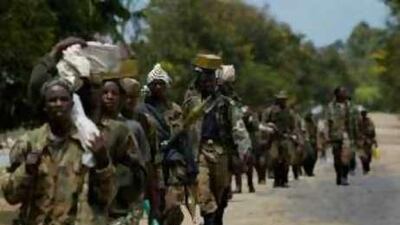MONROVIA // On a hot, cloud-covered night in Monrovia, groups of writers, teachers, literature students and expatriates gathered around long, wooden tables. They began sharing stories, which at first glance was nothing unusual - that is, after all, what writers do. But it was the nature of the stories that shocked. Tales of massacres and machete attacks were discussed. One woman stood up, smoothing her long curls and Liberian lappa dress. It was Elma Shaw, the first Liberian novelist to be published this side of the war that killed 250,000 people. She was there to launch her book Redemption Road, the tale of Bendu, an ordinary Liberian woman caught up in the bloody conflict. The novel has had a remarkable effect on the national psyche, effectively kick-starting the talking and healing process of a nation that was, until recently, frozen in its grief. "I want the book to open a national dialogue, to help us begin to talk to each other, to help us confront all the terrible, terrible things that happened from the 1980s until 2003. I want us to finally confront those things so that we can be truly healed," Ms Shaw said, addressing the crowd. It seems to be working. One by one, members of the audience got up to share their war stories. Many said they have never spoken openly about their experiences before, not even to close friends. Some stared at the ground while talking, others at the sky. One man took a paper napkin and wiped what could have been tears or sweat - perhaps both - from his cheeks. Five years have passed since the end of the Liberian war, fuelled in part by conflict diamonds and waged largely by child soldiers. The city of Monrovia is gradually returning to normal. Roads are being paved close to mass grave sites, jobs are slowly opening up and foreign investment is increasing. But ask a Liberian on the street how he is and you will probably be met with the response, "I'm trying". "Until we shift the memories of the past, we cannot move forwards" said Teresa Eidelmann, a South African expert on trauma and healing. "In a society that has experienced such a profound level of trauma, every person knows what it's like to go to [dark] places. We need to find ways to affirm the courage and strength of those who died, whose blood has been spilled on this soil. A truth commission is a way of affirming the memories of the past and building a better future." Modelled on the Truth and Reconciliation Commission set up in South Africa to help deal with what happened under apartheid, Liberia's Truth and Reconciliation Commission (TRC) began taking witness statements and organising public hearings last year. The organisation is currently touring Liberia, bringing the chance to testify to those living far from the capital. An electronic booth outside the TRC's offices in Monrovia allows people to share their stories anonymously. Some view the process as nothing more than an ongoing discussion akin to those held in palava huts across Africa; others see it as something more structured. Most Liberians are coming to the conclusion that it is necessary. "When silence is broken, what emerges first is rage and anger - which is key to understanding the silence," said Johnny Steinberg, an academic and author who is writing a book about the experiences of the Liberian diaspora in New York. "I came across one situation where a mother and son became separated during the war and found each other years later in Staten Island, New York. They lived together for five years and not once talked about their experiences during the Liberian war. They spent years shuffling around this black hole, terrified to look at it in case they fell in," Mr Steinberg said. At Ms Shaw's book launch, the author read a passage from Redemption Road. "A year with the fighters had changed her life forever, and she couldn't understand how so many war survivors could say so easily 'forget it, let it go' or 'let bygones be bygones'. For Bendu, forgetting was out of the question, but remembering and doing nothing about it was even worse." There is no bookshop in Liberia but the novel is sold in supermarkets and on street corners. There is even an audio version available for the 45 per cent of Liberians who cannot read. Ms Shaw said she would like to make it required reading in Liberian schools. "People should talk about these things in order to free them from their minds. If you keep them to yourself you will continue to grieve," said Peterson Sonyah, who survived a 1990 church massacre in which 700 people, including his father, were killed. "No nation can recover if it does not report, document and assess its experiences. I hope the book will contribute to the healing process. Now let us all come together to rebuild Liberia," said Wilton Sankawulo, an esteemed Liberian author, addressing the audience. The sound of applause joined the hum of mosquitoes and crickets. For the first time in what felt like weeks, a cool breeze blew through Monrovia, turning the pages of a copy of Redemption Road left on a table. kthomas@thenational.ae

For Liberia, redemption may be on the horizon
On a hot, cloud-covered night in Monrovia, groups of writers, teachers, literature students and expatriates gather.
Most popular today
